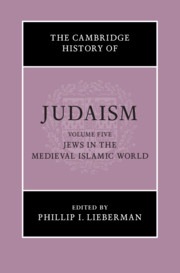Book contents
- The Cambridge History of Judaism
- The Cambridge History of Judaism
- The Cambridge History of Judaism
- Copyright page
- Contents
- Figures
- Acknowledgments
- Introduction
- Part I Jews in the Medieval Islamic World
- Part II Social and Institutional History
- Chapter 11 Demography and Migrations
- Chapter 12 Economic Activities
- Chapter 13 Jewish Religious and Communal Organization
- Chapter 14 Schools and Education
- Chapter 15 The Life Cycle and the Annual Cycle in Genizah Society
- Chapter 16 Family Life in Genizah Society
- Part III Spiritual and Intellectual History
- Index
- References
Chapter 12 - Economic Activities
from Part II - Social and Institutional History
Published online by Cambridge University Press: 21 August 2021
- The Cambridge History of Judaism
- The Cambridge History of Judaism
- The Cambridge History of Judaism
- Copyright page
- Contents
- Figures
- Acknowledgments
- Introduction
- Part I Jews in the Medieval Islamic World
- Part II Social and Institutional History
- Chapter 11 Demography and Migrations
- Chapter 12 Economic Activities
- Chapter 13 Jewish Religious and Communal Organization
- Chapter 14 Schools and Education
- Chapter 15 The Life Cycle and the Annual Cycle in Genizah Society
- Chapter 16 Family Life in Genizah Society
- Part III Spiritual and Intellectual History
- Index
- References
Summary
Those studying the economic activities of Jews in the medieval Islamic world find themselves in an odd position of glut and dearth. For the vast geographic and temporal sweep of medieval Islamic history, we still know relatively little about the economy in general. A lack of survey scholarship makes it difficult to know a great deal about the economic activities of the Jewish community as a whole for most of its history under Islam, and even more, how to interpret the smattering of economic information that comes from literary sources, chronicles, travelogues, geographies, geonic responsa, legal treatises and formularies. It is hard to understand or sometimes even identify the economic activities of Jews to which these documents occasionally refer, and even harder to put them in the broader context of Islamic society.
- Type
- Chapter
- Information
- The Cambridge History of Judaism , pp. 412 - 449Publisher: Cambridge University PressPrint publication year: 2021



